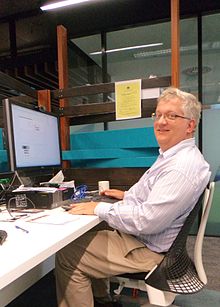| Revision as of 12:56, 20 January 2014 editUmais Bin Sajjad (talk | contribs)Extended confirmed users17,064 edits Added tags to the page using Page Curation (refimprove)← Previous edit | Revision as of 13:50, 17 March 2014 edit undoPigsonthewing (talk | contribs)Autopatrolled, Event coordinators, Extended confirmed users, Page movers, File movers, IP block exemptions, New page reviewers, Pending changes reviewers, Rollbackers, Template editors266,524 edits {{Authority control}}Next edit → | ||
| Line 49: | Line 49: | ||
| * | * | ||
| * | * | ||
| {{Authority control}} | |||
| {{Persondata | {{Persondata | ||
Revision as of 13:50, 17 March 2014
| This article needs additional citations for verification. Please help improve this article by adding citations to reliable sources. Unsourced material may be challenged and removed. Find sources: "Albert Schram" – news · newspapers · books · scholar · JSTOR (January 2014) (Learn how and when to remove this message) |
Albert Ernst Giovanni Schram (born 2 September 1964 in De Bilt, the Netherlands) is the Vice Chancellor of the Papua New Guinea University of Technology (UNITECH). He took over on 7 February 2012 from Misty Baloiloi, who had been Vice-Chancellor for 17 years. Schram is also Adjunct Professor at James Cook University's Cairns Institute (Australia) and at the University of Turabo Business School (Puerto Rico).

Academic Leadership
Since 1999, Schram took on managerial and executive positions in academia of increasing responsibility. From 1994 to 2003 he worked in San José, Costa Rica at the Latin American University of Science and Technology ULACIT where he attained the professor's rank in 1999, and supervised 5 PhD theses. From 1999 to 2003, he coordinated an environmental economics program for Central America at the University of Costa Rica. He also worked as advisor and environmental auditor for the Costa Rican Ministry of Environment and the Ecological Flag program for environmental management. For two and half years, he was research fellow at the University of Ghent's Center for Environmental Economics and Management. In 2005, he was Resident Lecturer and briefly Acting Director at the School for Field Studies "Center for Marine Resources Studies" on South Caicos (Turks and Caicos Islands).
In 2006, he became Academic Director at the Zuyd University's Maastricht Hotel Management School (the Netherlands). From 2007 to 2011, he was Research Funding Advisor at the Maastricht University's School of Business and Economics, where he received further training and coaching for executive roles. In this period, he visited Brussels frequently and became an expert in research and academic financing.
Schram also received training in Problem Based Learning for which this university is widely known. Maastricht University in 2013 attained the 6th position in the Times Higher Education World University Rankings for universities under 50 years old, and 7th position in the corresponding QS World University Rankings.
Academic and Policy Work
Schram has published his PhD thesis with Cambridge University Press in 1997 with the title "Railways and the Formation of the Italian State in the Nineteenth Century". Afterwards he published on a wide variety of topics in management and social sciences: corporate social responsibility, environmental and experimental economics, economic valuation, climate change, green economy, time use sociology, health care management and risk assessment.
In 2011, he carried out the policy review on corporate social responsibility for the Directorate General for Research and Innovation (European Commission). In 2011, he was team leader for the scoping study on the green economy for the European External Action Service for the Rio+20 UN summit with case studies on Canada, South Korea, China, Thailand, Brasil, Mexico and Tunisia.
His long term research interests are the role of multi-national companies and emerging large technological systems in social and economic development in the long run. Schram's thinking on development was strongly influenced by the courses by Prof. Nicholas Stern on development economics he followed at the London School of Economics in 1993.
Schram taught university courses in English and Spanish at all levels in environmental economics and policy, corporate social responsibility, international business environment, the history of multi-national companies and on project management and financing for global health care practitioners.
From 1996, he used the internet for his teaching, and employs a student centered approach to teaching through case studies and problem-based learning. He has been invited as guest lecturer in various European and Latin American countries, USA, China, and India.
Biography
Albert Schram is the oldest of two children. His father Kees Schram is a Dutch theoretical physicist. His mother, Laura Pighi, is a scholar of Italian literature. From a young age he has travelled throughout Italy and Europe.
Schram was educated in the Netherlands until his Masters Degree. He completed the Gymnasium B program at Het Nieuwe Lyceum in Bilthoven with Latin and advanced Mathematics. He did his Masters in European history at the University of Utrecht, for which he obtained a 3 months scholarship from the Netherlands Institute in Rome.
From 1990 to 1993, he received a 3 year PhD scholarship for the European University Institute in Fiesole (Italy). In 1994, Schram obtained his doctorate degree in the field of Economic History from this institute. Since then he has taken up residence in Costa Rica, Nicaragua, Guatemala, Belgium, the Netherlands, Turks and Caicos Islands, Italy, and Papua New Guinea. He is married and has no children.
References
- http://www.postcourier.com.pg/20120209/news22.htm
- http://ec.europa.eu/research/social-sciences/pdf/policy-review-corporate-social-responsibility_en.pdf